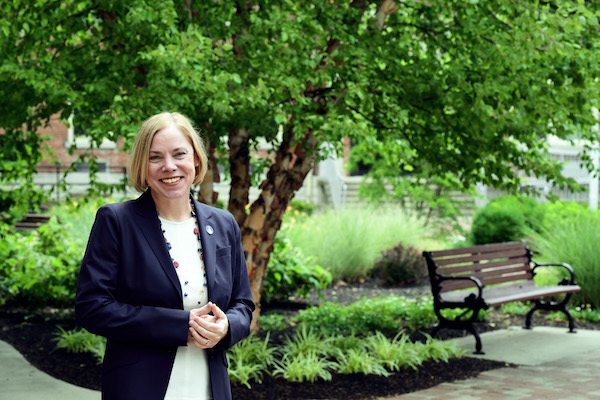President's Blog: From the Heart

A Marianist Heart
By Eric F. Spina
As a child, Darlene Weaver yearned to be a writer like Jo March in Little Women.
So how did she traverse through life and become a prominent moral theologian and eventually the first woman and externally hired provost and executive vice president of academic affairs at the University of Dayton? Who is Darlene Weaver, the person behind the impressive 36-page curriculum vitae?
I asked my colleague, Teri Rizvi, to tease out the answers during a session at the President’s Council annual summer retreat at Maria Stein.
In an hour-long Q&A interview we learned that she grew up in the railroad hub of Altoona, Pennsylvania, where she and her three siblings were raised largely by her mother, a parish secretary, after their musician father died when she was 11. Her mother, she says, is her “moral hero.” She’s a lifelong reader who’s currently working her way through Louise Penny’s Chief Inspector Armand Gamache murder series and Patrick Lencioni’s The Advantage: Why Organizational Health Tops Everything Else in Business. She counts Marilynne Robinson’s Home among her favorite books. Known for “being scrappy,” she played basketball as a child and field hockey at Carnegie Mellon University, where, as a Pell Grant recipient, she graduated with honors with a bachelor’s degree in professional and creative writing. She lives with her husband, Sean, director for anti-discrimination compliance and assistant director for risk management at Duquesne University, and a “rambunctious, mischievous crew” of three sons, ages 12 to 19, in Oakwood, where a family game night of Spoons “can be a contact sport.”
Throughout the interview, her thoughtfulness, intellect, humor, humility, and grace took center stage. A few snippets:
Why Dayton? Why now?: “The clarity, conviction, and courage around mission and values were deeply appealing to me. …What made me a longstanding admirer of the University of Dayton was the DEI (Diversity, Equity, Inclusion) plan. It’s comprehensive, thoughtful, and publicly accessible. In a lot of ways, it prepared my heart.”
Her educational path: “No one grows up thinking, ‘I want to be a moral theologian.’ I didn’t know what graduate school meant, but I saw a poster one day in the hallway advertising a summer session at Oxford and I applied. When I was accepted, I showed the letter to my mom and said, ‘Wow, I know I can’t go, but at least I got in.’ She went to the credit union and took out a loan so I could go. …I spent the summer in the Bodleian Library reading about Spanish mystics, John of the Cross and Saint Teresa of Ávila — real uppers, by the way — and thinking, ‘This is my jam.’ The work of deep reading, reflection, and thinking were such a joy.”
Her faith: “It’s the way I make meaning of the world and understand myself through the lens and experience of grace. It’s absolutely core to my identity and shapes my basic operating belief that people are fundamentally good, but also really, really broken. We have an obligation to work for the common good and learn to live as people who have been forgiven — and who need to keep forgiving.”
The Marianists: “The Marianist focus on community, commitment to vulnerable populations, and courage for entering into dialogue and coming to the table were all deeply attractive to me.”
A trait not on her résumé: “I have an acute sense of responsibility. Being the eldest daughter of a widowed mother, I try to think ahead, anticipate needs, not be the person who causes a problem. (laughs) It shapes the way I (approach) the world, but it’s also why I’m an ethicist.”
Leadership style: “No matter what I say, there could be people saying, ‘Yeah, I’m not seeing that.’ (laughs) I do very much try to work collaboratively but own my own mistakes and limitations, ask for feedback — and try to pivot. I constantly try to learn and improve. …I listen to (leadership) podcasts and am constantly figuring out how I can show up with and for all of you. I’m excited to be with all of you driving the institution where it needs to go.”
The future: “AI is going to completely transform what it means to develop a workforce. We’re going to have to rethink our programs and what it means to prepare students in an environment that will radically alter the work that we do.”
At the start of the retreat, Crystal Sullivan, executive director of Campus Ministry, led us in a Marianist leadership prayer, encouraging administrators to prize community in service of mission, foster equality, and exercise authority that is encouraging of the human spirit.
As I listened to Dr. Weaver talk about what inspires her about her new role, I reflected that her Marianist heart will help lead our great university forward.
